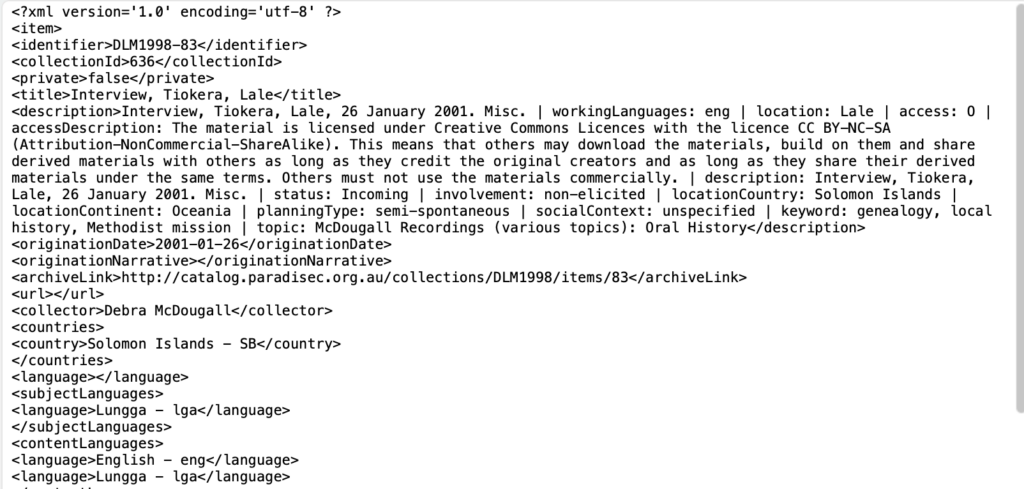Recall that we have been developing a way of returning materials from the PARADISEC collection to source communities using the Raspberry Pi (see the earlier posts here and here )
This work is predicated on our catalog writing a text file into an item’s directory, a text file that contains all the information in the catalog for that item. Currently, this file is an XML file as you can see in this extract:
By taking any arbitrary set of openly avalable items from the collection we can set up a new subcollection for delivery to a particular community. For example, we can take all items recorded in a village or region, by a range of different recorders and from a range of collections. We place these items on a hard disk and then run a routine to harvest the information from the text files and to create a simple HTML catalogue of just those items. This routine, written by Marco La Rosa, is called Dataloader and is freely available.
Recently, one of our despositors, Debra McDougall, went to the western Solomon Islands island of Ranonnga. She had made recordings there over the past twenty years and has carefully archived all her recordings in PARADISEC (collection id DLM1998). Before she went on the current trip we prepared the Raspberry Pi, including ensuring the battery supply worked for it to run in the absence of mains power.
When she got to the village, she discoverd that 14 of the 87 items had not loaded properly. Using a Starlink internet connection she got in touch with us to troubleshoot. She was able to download the missing mp3 files from the catalog, but the text files are not visible to users, only to administrators of the collection, so I sent her the text files. She then inserted them into directories together with the mp3 files, and ran the dataloader, building a new instance of just the new items.
This is a great example of how repatriation of files can work and we are further developing the system this year with funding from the Australian Research Council’s LIEF scheme. Now, instead of using an idiosyncratic XML format, we have adopted the Research Object Crate (RO-Crate) standard (based on schema.org annotations in JSON-LD). We are currently exporting RO-Crate version of all 41,000 items in the collection, containing 424,000 files. We will then have a standards-compliant textual version of our metadata, and one that conforms to the work being done by the Language Data Commons of Australia (LDaCA). This means that the new version of Dataloader that we will write will work for any collection that uses RO-Crate, a much more productive path that makes the work usable by others.

 Follow
Follow